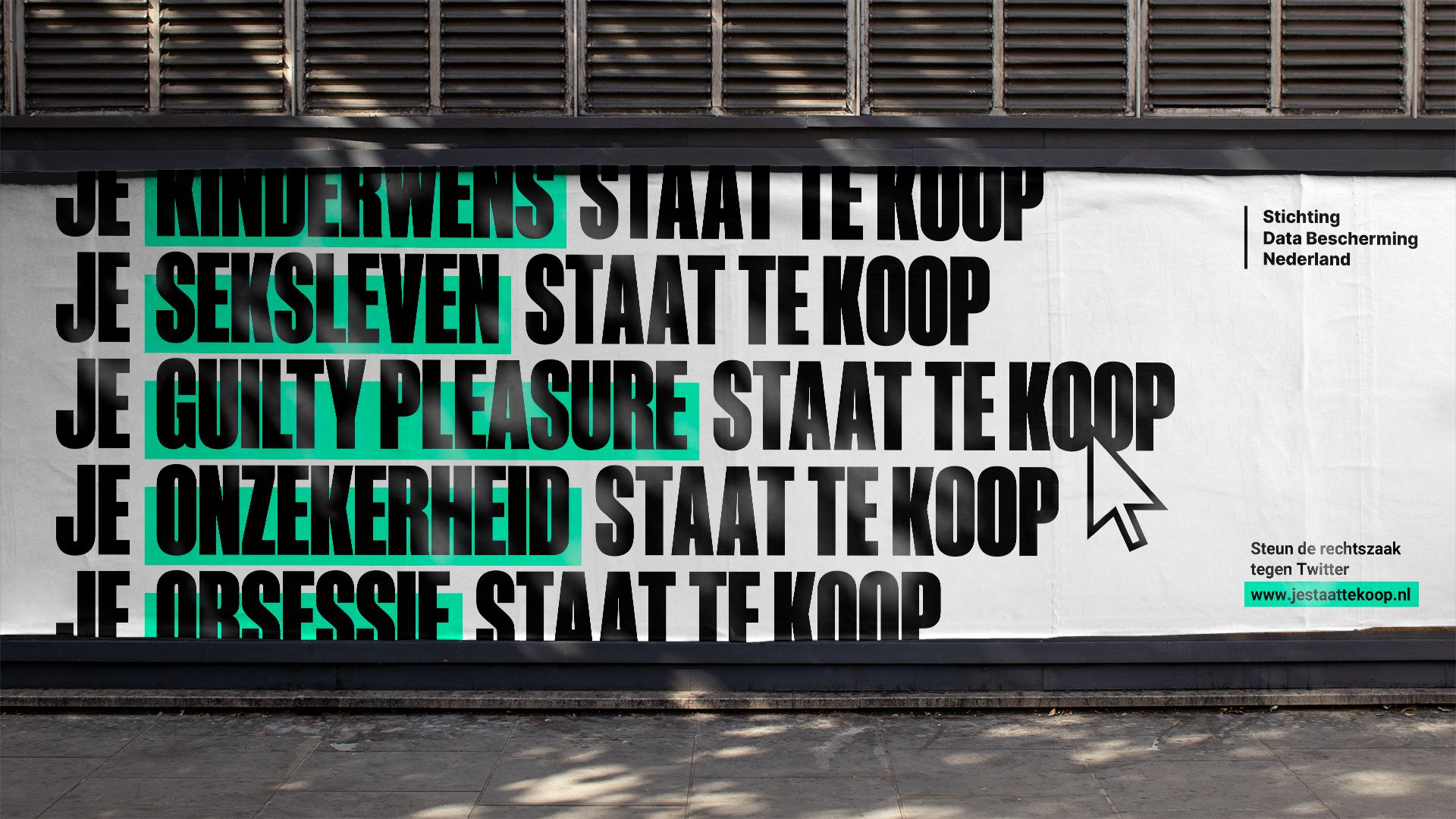Stichting Data Bescherming Nederland
jestaattekoop.nl/Bringing Twitter to court: a campaign to protect your online data
Suing Big Tech for illegal trade in personal data
Stichting Data Bescherming Nederland is going to sue tech giant Twitter. The company MoPub – which Twitter owned until 2021 – has been trading data obtained illegally for years. Personal data of millions of Dutch people that they get from apps that you and I often use, such as Shazam, Vinted, dating apps such as Happn or fitness or cycle trackers. This way they know, for example, that you are trying to conceive or that you are sensitive to an eating disorder. Very personal information, which they sell to advertisers. But you never gave permission for this and MoPub breaks the GDPR privacy law.
To oppose this, Stichting Data Bescherming Nederland is initiating a mass claim. And is it important that it is signed by as many victims as possible – virtually everyone with a smartphone – in order to convince the judge that something needs to be done about this.
Data privacy and ethical tech are in GRRR’s DNA, we have an eye for this in all our projects. When Stichting Data Bescherming Nederland asked us to develop a campaign that stands up for our digital privacy, the choice was simple: we are going to oppose against this big tech together.
We worked on the campaign ‘Je staat te koop (you are for sale)’; which uses a creative idea to make complex matters simple and urgent. It set a whole group of Dutch people in motion to leave their signature to support the lawsuit.

Make complex matter understandable
The first focus in the campaign strategy is to convey the seriousness of this privacy violation, as people can be somewhat skeptical about online privacy. Because how bad is it if the internet knows that I’m looking for a new sports outfit? And that I therefore receive targeted advertisements?
What many people don’t know is that the consequences of the illegal data trade go much further than seeing a sports shoe pass by in Buienradar. MoPub is deliberately not transparent about what data is collected from you and what is done with it. There is a lot of money to be made with that.
By combining your search, swipe and click behavior in all those apps, this company can create profiles of you that include your sexual preferences, your race, your desire to have children, your addiction. It can even go as far that when you’re pregnant, you don’t get to see certain job offers. Or that your insecure teenage daughter is bombarded with advertisements for strict diets. This means that your personal data can be used against you or your children. This goes even further than exceeding your privacy: it affects your autonomy as a human being. And that so that big tech companies can become even richer.
In short: You are for sale. And that is central to the campaign. We developed a confrontational campaign style with copy that stands out and makes you think. Copy that clarifies the complex technical matter, is legally correct and provides more context in, among other things, an explainer video and clear texts on the website.

Gain confidence with a distinct design
Explaining the far-reaching consequences of this data trade is not enough. Because in order for people to take action, trust in the organization behind the claim is also essential. The foundation is still new, and may not yet be known to followers of the digital privacy theme – such as journalists. While journalists can play an important role in drawing attention to this subject.
In our campaign we show that Stichting Data Bescherming Nederland is an organization with extensive knowledge about digital privacy. We do this by informing the reader: the steps leading up to the lawsuit are clearly explained on the site. And by giving the ambassadors – who have long been experts in the field of digital privacy – a central role in the story. We support the professionalism of the foundation with a striking visual identity.
You can imagine that a campaign like this requires a different approach than when you promote a soft drink brand. We deliberately wanted to stay away from the aesthetics of advertising, in order to emphasize the trustworthiness of the foundation. This requires an extra step of thinking in the concept phase.
We have therefore opted for a sec, but distinct design that focuses on copy. The white background makes it different from ads. In the advertising world, a lot of red, yellow or orange is used because those colors attract attention. Yet we manage to capture the attention by playfully deploying and echoing the cursor – a reference to the online world.
Campaigning about privacy in an honest way
In addition to the fact that the campaign should not look like an advertising campaign, SDBN can of course not use commercial campaign tactics. You cannot support a campaign that shows that your data is advertising material and use targeting to do so. A clear case of ‘practice what you preach’. So from campaign strategy to execution, transparency and reliability are key.
That makes it more challenging to get the campaign to the attention of the right people. In our campaign strategy we therefore focus on advertisements in newspapers and magazines and on free publicity in reliable media with a strong and legally sound story.
Translate media attention into signatures
Fortunately, there was serious media attention for this important issue, including on the radio and in podcasts and with extensive coverage in the major newspapers. We had already anticipated this: after coverage on the front page of Trouw, people searched Google for how they could support the action. Then it is important that they quickly get to the site where they can leave their signature. And prevent that they can’t find the right page because of all the media messages in the search results. So setting up a funnel was an important part of the strategy. Supported by SEA on the right search terms and well-designed SEO on the website.
We don’t do it alone
In collaboration with Julia Janssen and Jeroen Barendse.
Dieke de Boer, Jasper Plender, Vaughn Tan, Anouk Ruhaak

